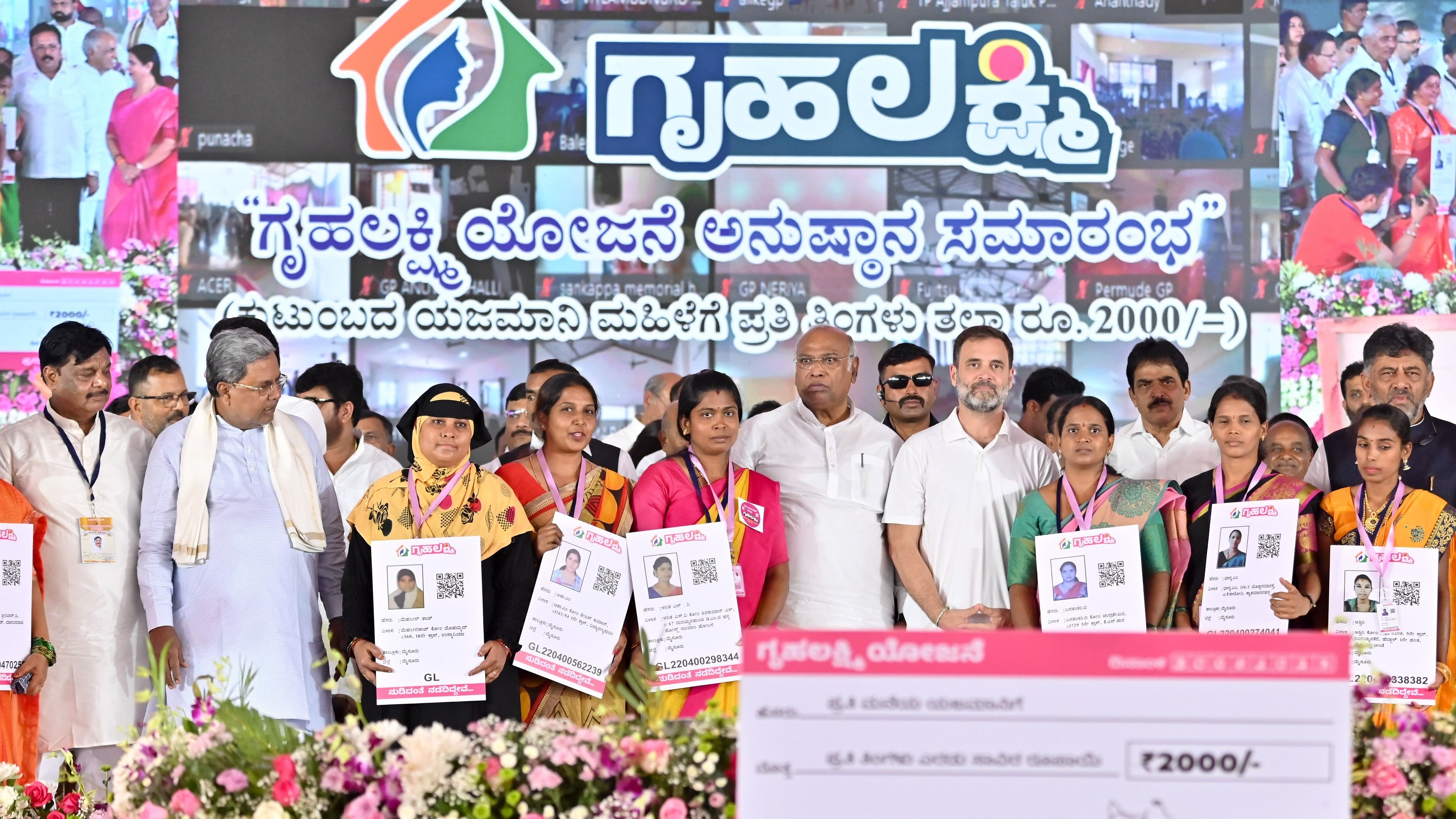
Minister H C Mahadevappa, Chief Minister Siddaramaiah, Congress president Mallikarjun Kharge, Congress leader Rahul Gandhi, Deputy Chief Minister D K Shivakumar and others pose with the beneficiaries at the launch of the Rs 2,000-per month guarantee scheme for women in Mysuru last year.
DH File Photo
Bengaluru: In the recent Lok Sabha elections, the Congress in Karnataka wanted to upend the notion that welfare schemes do not translate into votes.
The five flagship ‘guarantee’ schemes had contributed significantly to the Congress’ big win in the Assembly polls last year.
In about a year’s time, the Siddaramaiah-led Congress government accumulated 5.01 crore beneficiaries under the ‘guarantee’ schemes.
This came at a staggering cost to the exchequer - Rs 36,435 crore in 2023-24 and Rs 52,009 crore this fiscal.
Criticism trickled in as conventional ‘development’ works - roads, bridges, canals, etc - took a backseat because funds were diverted towards the guarantees.
But the government, through direct cash transfers providing economic stability to citizens, sought to reimagine the pop banner of
‘bijli, sadak, paani’ (electricity, road, water).
And, beneficiaries of the guarantees will vote for Congress, the party leadership told itself and the cadre. Especially women, the biggest beneficiaries. A 10-15% swing in women’s votes was anticipated.
The result? Congress won nine out of the 28 seats, failing to cross the double-digit mark and far from its target of 15-20.
The blame? Guarantees failed to bring votes, according to party spokesperson M Lakshmana (Mysore-Kodagu Lok Sabha candidate), Magadi MLA H C Balakrishna and Bilgi MLA J T Patil.
“The guarantees didn’t work in many places. We’ll ask the CM to reconsider the schemes. There’s no development happening and beneficiaries of the schemes aren’t voting for us either,” Patil said.
A class divide might have upset Congress’ plans.
“In Kalyana Karnataka, which is backward and has poverty, the guarantees have worked,” senior Congress lawmaker B R Patil, who is Siddaramaiah’s advisor, told DH.
“But in the richer Kittur Karnataka and old Mysuru regions, the guarantees haven’t worked.” He suggested that a committee be formed to further understand what happened.
By basing its Lok Sabha campaign on the ‘guarantee’ schemes, was Congress re-using a cheque it had already cashed last year by winning the Assembly polls?
In any case, there is “limited hard evidence of schemes translating into votes,” as Shikhar Singh, a postdoctoral research fellow at the Centre for the Advanced Study of India, University of Pennsylvania, wrote early this year.
During the Lok Sabha poll campaign, a senior minister in the government told DH that a section of MLAs was simply not doing enough to extract political advantage out of the guarantees. “The MLAs are the biggest villains of the guarantees, because there is nothing in it for them!” the minister rued.
Normally, ruling party MLAs besiege the chief minister with sundry fund requests for infrastructure works in their constituencies. Weighed down by the guarantees, Siddaramaiah has had to ‘shoo away’ his MLAs seeking off-budget grants. Some MLAs, if not all, are frustrated.
Another view evolving in the government, in line with B R Patil’s observation, is that the ‘guarantee’ schemes must be made applicable only to the deprived. Politically, this can create a more targetable group of beneficiaries.
“If a scheme like Gruha Jyothi (free power up to 200 units) is available to a bureaucrat who retired with a fat paycheck, then something is seriously wrong with your programme,” a policymaker closely involved with the ‘guarantee’ schemes said.
But will the Congress government bite the bullet and lose some of its ‘guarantee’ weight?
